2025年中考英语语法名词冠词课件(共72张PPT)
文档属性
| 名称 | 2025年中考英语语法名词冠词课件(共72张PPT) |

|
|
| 格式 | pptx | ||
| 文件大小 | 430.6KB | ||
| 资源类型 | 教案 | ||
| 版本资源 | 外研版 | ||
| 科目 | 英语 | ||
| 更新时间 | 2024-07-20 11:31:41 | ||
图片预览

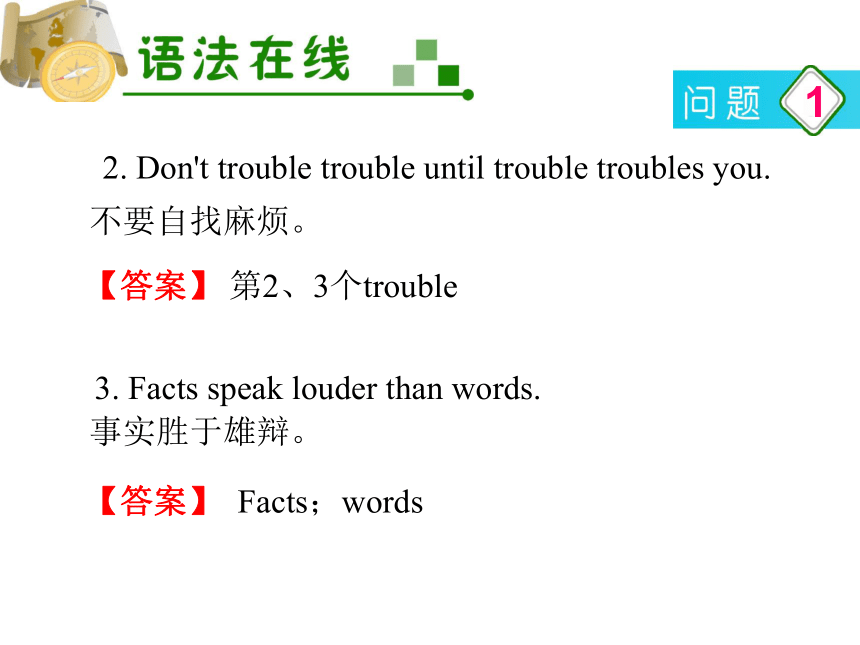
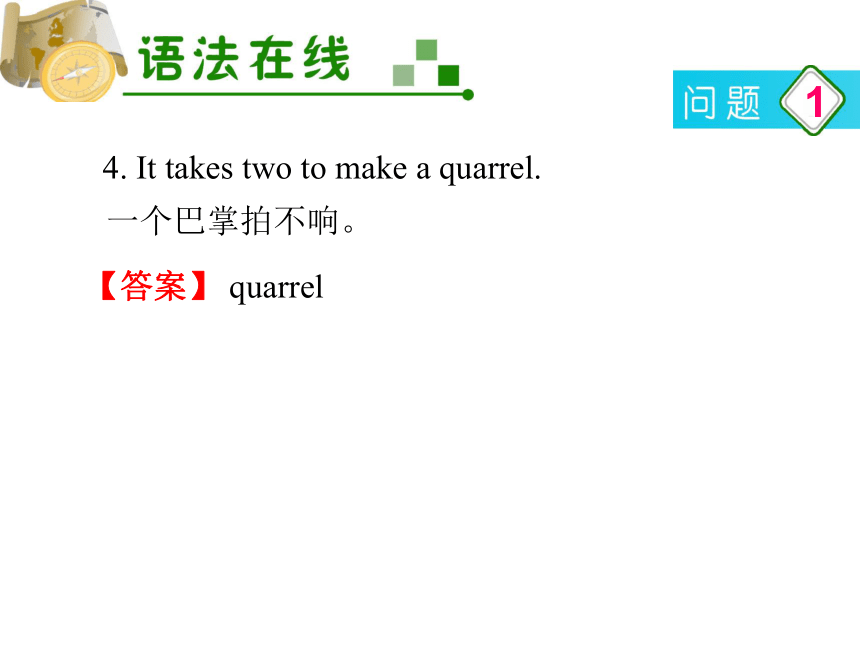
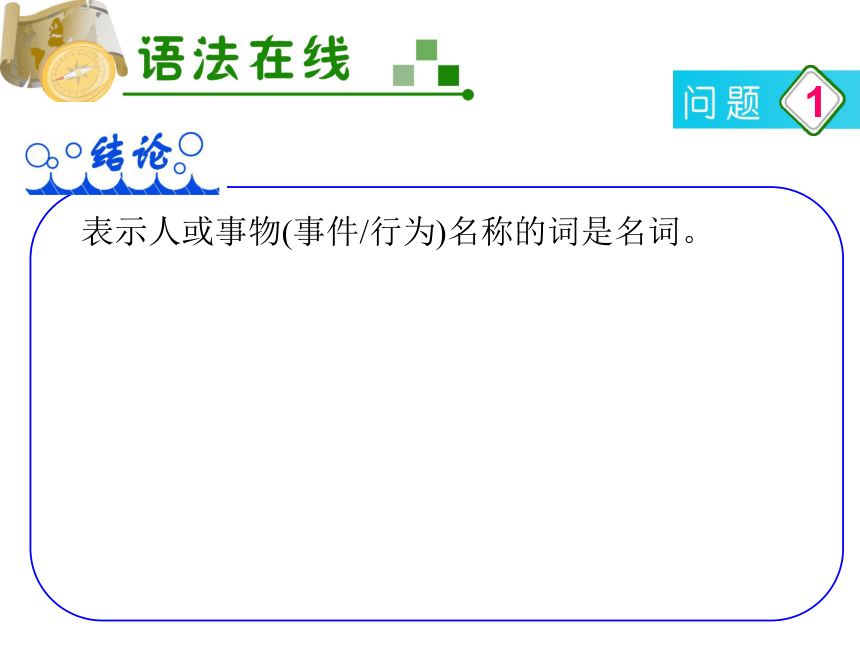

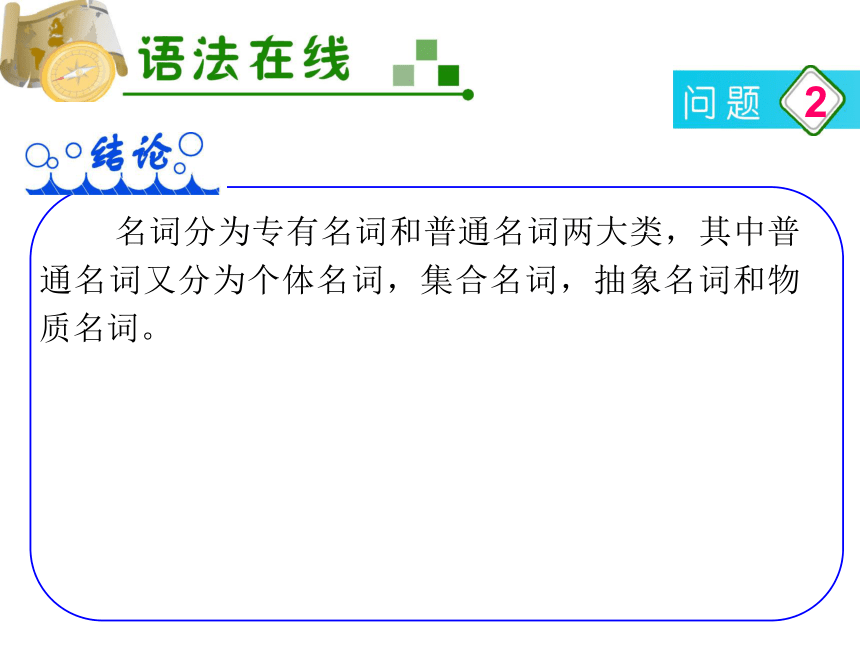
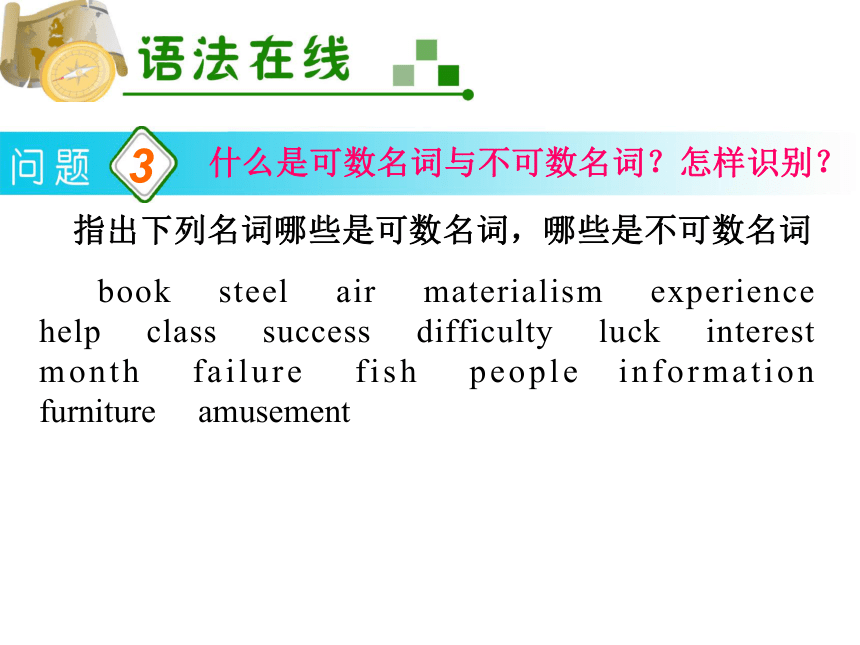
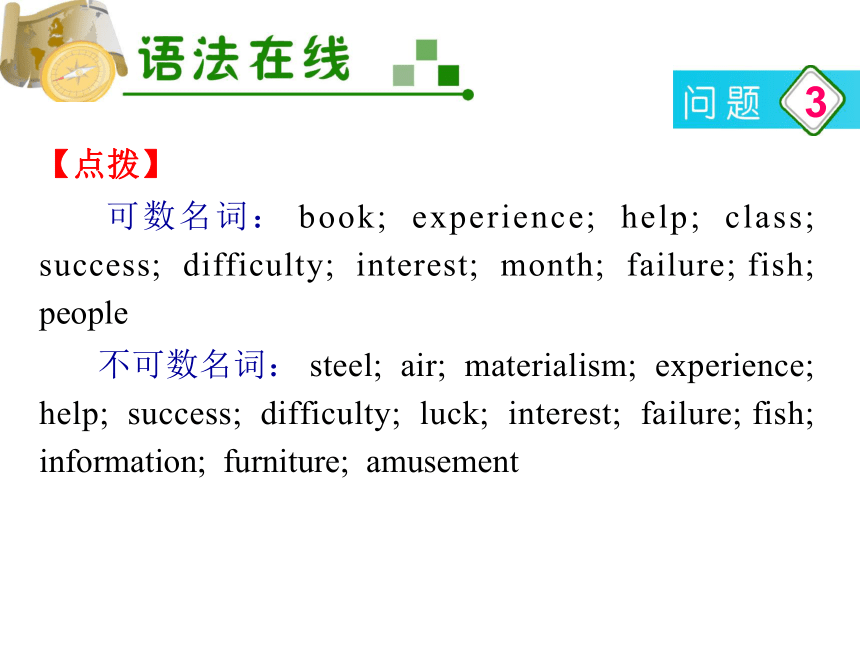
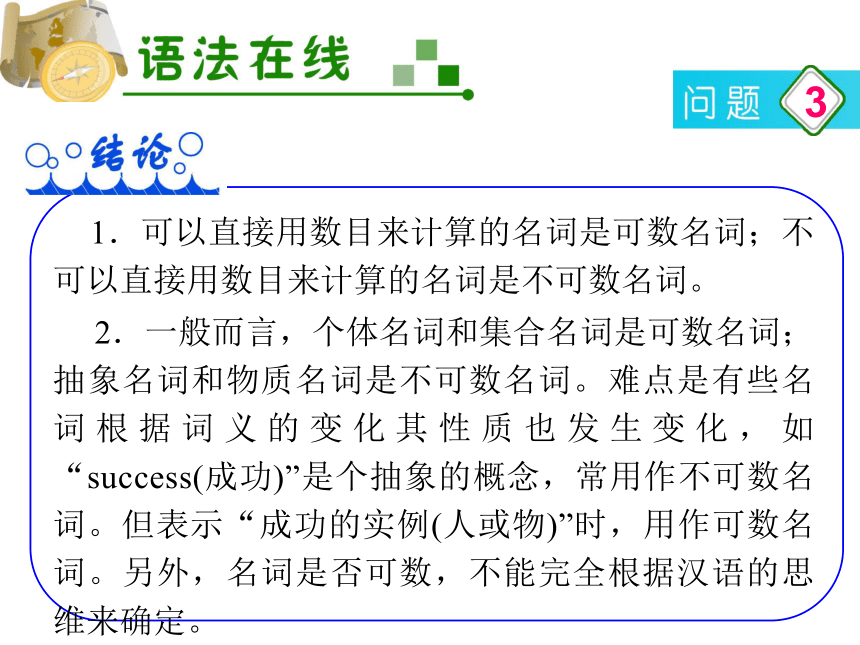
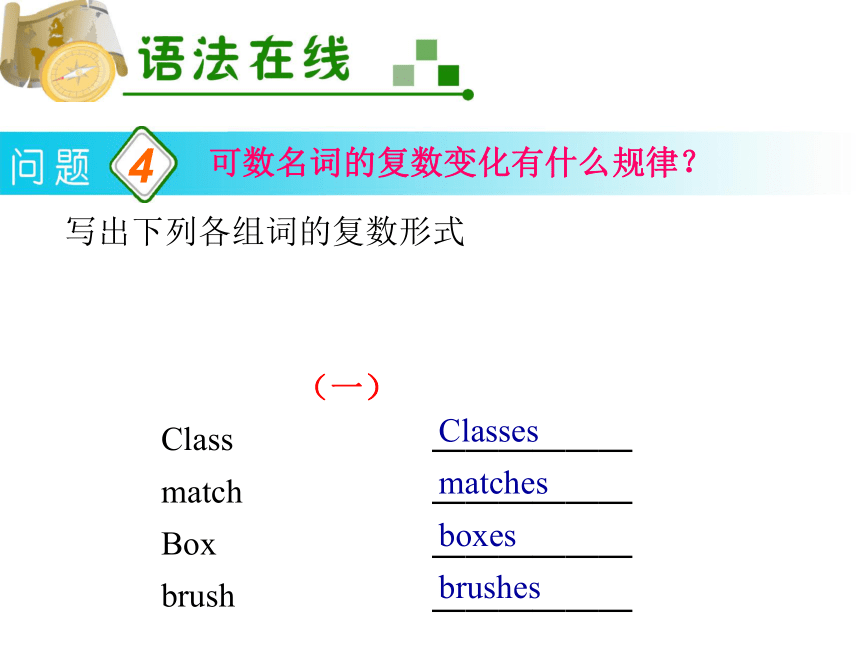
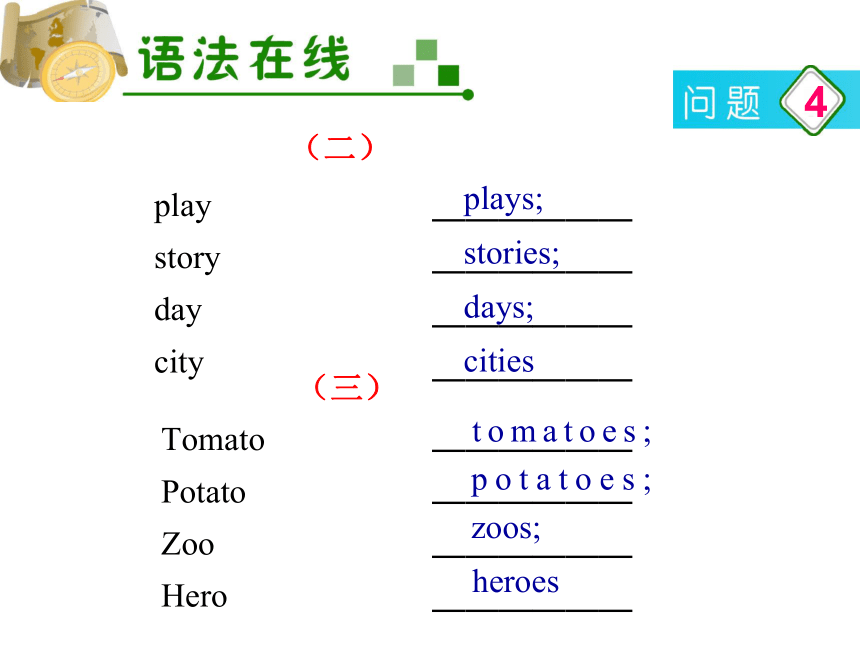
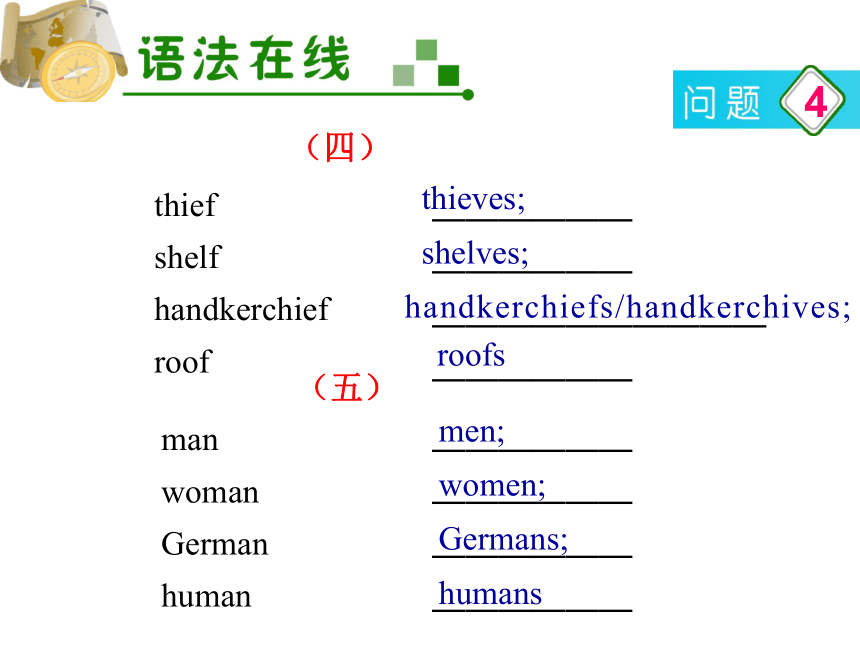
文档简介
(共72张PPT)
指出下列句子中的名词
1. John is watering the flowers in his garden.
约翰正在花园里给花浇水。
1
什么是名词?
【答案】 John; flowers; garden
一、名词
2. Don't trouble trouble until trouble troubles you.
不要自找麻烦。
1
【答案】 第2、3个trouble
3. Facts speak louder than words.
事实胜于雄辩。
【答案】 Facts;words
4. It takes two to make a quarrel.
一个巴掌拍不响。
1
【答案】 quarrel
1
表示人或事物(事件/行为)名称的词是名词。
观察各组单词的特点,指出其类别
1.family class school
2.pen man book
3.idea communism style
4.John China Japan
5.rice milk water
2
名词有哪些类别?
集合名词
个体名词
抽象名词
专有名词
物质名词
2
名词分为专有名词和普通名词两大类,其中普通名词又分为个体名词,集合名词,抽象名词和物质名词。
指出下列名词哪些是可数名词,哪些是不可数名词
book steel air materialism experience help class success difficulty luck interest month failure fish people information furniture amusement
3
什么是可数名词与不可数名词?怎样识别?
3
【点拨】
可数名词: book; experience; help; class; success; difficulty; interest; month; failure; fish; people
不可数名词: steel; air; materialism; experience; help; success; difficulty; luck; interest; failure; fish; information; furniture; amusement
3
1.可以直接用数目来计算的名词是可数名词;不可以直接用数目来计算的名词是不可数名词。
2.一般而言,个体名词和集合名词是可数名词;抽象名词和物质名词是不可数名词。难点是有些名词根据词义的变化其性质也发生变化,如“success(成功)”是个抽象的概念,常用作不可数名词。但表示“成功的实例(人或物)”时,用作可数名词。另外,名词是否可数,不能完全根据汉语的思维来确定。
Class
match
Box
brush
4
可数名词的复数变化有什么规律?
写出下列各组词的复数形式
(一)
——————
——————
——————
——————
Classes
matches
boxes
brushes
4
play
story
day
city
(二)
Tomato
Potato
Zoo
Hero
(三)
——————
——————
——————
——————
——————
——————
——————
——————
tomatoes; potatoes; zoos;
heroes
plays;
stories;
days;
cities
thieves;
shelves;
handkerchiefs/handkerchives; roofs
4
thief
shelf
handkerchief
roof
(四)
man
woman
German
human
(五)
——————
——————
——————
——————
——————
——————
——————————
——————
men;
women;
Germans;
humans
4
tooth
goose
foot
(六)
child
ox
(七)
——————
——————
——————
——————
——————
children;
oxen
teeth
Geese
feet
4
bacterium
phenomenon
(八)
basis
analysis
(九)
——————
——————
——————
——————
bases;
analyses
bacteria;
phenomena
4
Chinese
aircraft
means
sheep
(十)
people
fish
(十一)
——————
——————
——————
——————
——————
——————
people/peoples
fish/fishes
Chinese; aircraft; means;
sheep
4
father in law
editor in chief
touch me not
(十二)
——————
——————
——————
fathers in law;
editors in chief;
touch me nots
4
可数名词的复数变化有如下规律:
1. 以s,x,ch或sh 结尾的名词在词尾加 es。但stomach变成复数为stomachs。
2. 以y结尾的名词分两种情况。其中以元音字母加 y结尾的词在词尾直接加 s,以辅音字母加y结尾的词改y为i再加 es.
3. 以o结尾的名词变复数无规律可言,但中学阶段以o结尾变复数加es的单词可概括为“两人两菜”:
4
Negro 黑人;heroes英雄;tomatoes番茄; potatoes马铃薯。其他加 s。
4. 以f/fe结尾的名词变复数也无规律可言,但中学阶段以f/fe结尾变复数改f/fe为v加 es的单词可概括为“贼(thief)的妻子(wife)头戴树叶(leave)用架子(shelf)上的半(half)把小刀(knife)结束了一只狼(wolf)的生命(life)”。其他加 s。
5. 含man的单词,通常改其中的元音字母a为e。
4
但直接加s的单词有三个:Roman, German, human。
6. 单词中间含oo的单词,通常改其中的元音字母oo为ee。
7. 加(r)en变复数的单词:child(ren); ox(en)。
8. 以a为复数形式的单词:bacteria; phenomena。
9. 改is为es变为复数形式的单词:bases; analyses。
10. 单复数同形的单词。其中单复数同复数形式
4
的单词主要有:means; works;series;species。单复数同单数形式的单词主要有:Chinese, Japanese,aircraft,sheep,deer,swine,fish等。
11. people表示“人”时,单复数同单数形式;表示“民族”时,复数须加 s;fish单复数同单数形式,复数形式fishes表示“各种各样的鱼”。
12. 含有主体名词的复合名词变复数,在主体名词上变化,如fathers in law; 无主体名词的复合名词
4
变复数,在词尾上变化,如touch me nots。其他情况一般加 s。
5
不可数名词有复数形式吗?
指出画线部分单词的含义
1. Healthy diet should include vegetables.
【答案】 (各种各样的)蔬菜
5
2. It's dangerous to cross waters around this island.
【答案】(很多的水体) 水域
5
不可数名词一般无复数形式。偶有复数形式,用以表达种类的多,又如各种食物表达为“foods”;或表达数量的多,又如树林表达为“woods”(很多树),沙地/滩/漠表达为“sands”(很多沙子)。
6
a(n) 可以修饰不可数名词吗?
翻译下列句子
1. I'd like a coffee.
【答案】我想要杯咖啡。
6
2. Travelling on that lonely island was a terrible experience.
【答案】在那个荒岛上旅行是一场可怕的经历。
6
不可数名词前一般不能用不定冠词,但在物质名词个体化或抽象名词具体化的情况下,可以使用。如a coffee 意为“一杯咖啡”,此时coffee变成个体名词; “He is a failure as a writer.”中的a failure意为“失败者”,此时failure具体化,由抽象名词变为个体名词。
7
翻译下列各组短语
1. 老师们的办公室, 我表弟的自行车,儿童节
2. 树的叶子,桌子的腿
3. 地球的表面, 中国的人口,步行一小时的路程
名词所有格怎么表达?
7
【点拨】
1. the teachers' office; my cousin's bike; Children's Day
2. the leaves of the tree; the legs of the table
3. the earth's surface; China's population; an hour's walk
7
1.人或动物的所有格常用's形式表达,如果该名词本身是复数,且以s结尾,则只需在词尾标注'。
2. 无生命的名词(通常是物体或植物)的所有格常用of结构表达。
3. 少数第二类名词用第一种形式表达所有格。这些名词主要是时间,天体,国家等。
8
指出画线部分充当的句子成分
1. Basketball is my favorite sports.
2. What you need is confidence.
3. His careless driving caused the_accident.
4. We elected Mr. Li head of our school.
5. This kind of flower is called carnation.
6. Beijing, capital_of_China,_is worth visiting.
名词在句子中充当什么成分?
主语
表语
宾语
宾补
主补
同位语
7. I'd like to buy a coffee cup.
定语
8
名词在句子中分别充当主语,宾语,表语,宾补,主补,同位语,定语或状语。
9
翻译下面短语和句子,说出它们有什么不同
1. A. the Party members
B. the Party's calls
2. A. Please don't put the dog's food under the table.
B. Dog food costs as much as meal.
名词、名词所有格作定语有什么区别?
9
【点拨】
1. A A.党员; B. 党的号召。在“党员”中,名词定语表示members的性质;在“党的号召”中,Party具有动作发出者的作用,calls虽然是名词,却具有动作的含义。
2. A A.请不要把狗粮放在桌子下面。B. 狗粮和人的食品一样贵。前句 dog's food,特指给某一条狗食用的。后者指类别,即供狗食用的食品,并非只给某条狗食用。
9
1.名词作定语强调“类指”,而名词所有格则表示“特指”。
2. 一般来说,名词作定语通常说明被修饰的词的性质,而名词所有格作定语则强调对被修饰的词的所有(权)关系或表示逻辑上的谓语关系。
翻译下列句子
1. The walkman you bought me early this month works well.
1
什么是定冠词?
【答案】这个月初你给我买的那个随身听很好用。
二、冠词
2. The novel you are reading is worth reading.
1
【答案】 你正在看的这本小说值得一看。
1
英语中常用来表特指,意思相当于this(these)/ that(those)的前位限定词the是定冠词。
翻译下列句子
1. I'd like a pair of sunglasses to protect my eyes.
2
什么是不定冠词?
【答案】 我想要副太阳镜保护眼睛。
2. Fetch me a paper box,please!
2
【答案】请帮我去拿个纸箱过来。
2
a (an)与数词one 同源,常表类别,被修饰词具有不确定的含义,是“其中一个”的意思。a用于辅音音素前,而an则用于元音音素前。a/an叫做不定冠词。
指出下列句子中定冠词的用法
1. I'd like to buy a car. The car should be powered by new energy.
我想买辆车。这辆车应该用新能源做动力。
2. As is known to all, the earth is a planet.
众所周知,地球是行星。
3. The lion is a wild animal.
狮子是野生动物。
3
定冠词有哪些常见用法?
4. The living should carry out what hasn't been carried out by the dead.
生者应该完成逝者未竟的事业。
5. Coca cola,though not good for health, is the most popular drink in and out of America.
虽然可口可乐不利于健康,但它却是美国国内外最受欢迎的饮料。
6. The Smiths have a wonderful sense of humor.
史密斯一家人很幽默。
3
7. The Pacific is the largest ocean while the Arctic smallest.
太平洋是最大的海洋而北冰洋是最小的。
8. I go to the cinema, the theatre, the circus, the ballet and the opera to make my life colorful.
我去看电影、戏剧、马戏、芭蕾舞和歌剧,以此充实自己的生活。
9. The Hilton Hotel is where money is spent like water.
希尔顿酒店是挥金如土的地方。
3
10. According to the Times, more communication will be made between these groups.
根据《泰晤士报》报道,这些组织将进行更多交流。
11. The WHO stands for the World Health Organization.
WHO代表世界卫生组织。
12. I'm the David Copperfield that lives in Japan.
我是住在日本的大卫·科波菲尔。
3
13. The telephone was invented by Bell.
电话是贝尔发明的。
14. It would be nice if I could play the piano.
要是我会弹钢琴该多好。
15. He hit me on the head.
他打了我的头。
16. The People's Republic of China was founded in the October of 1949.
中华人民共和国成立于一九四九年的十月。
3
3
定冠词the在下列情形中使用:
1. 表示第二次提及或双方都知道的人或物。
2. 表示世界上独一无二的天体。
3. 用于单数可数名词前面, 表示某一类人或事物。
4. 用于形容词、分词前, 表示一类人。
5. 用于序数词及形容词或副词的最高级前。
6. 和姓氏复数连用,表“一家人”。
3
7. 放在“海洋, 河流, 岛屿, 山系, 沙漠及由普通名词构成的国名”前。
8. 放在娱乐场所或媒体前。
9. 放在宾馆前。
10. 放在报纸前。
11. 放在大型的组织机构及其缩略名前。
12. 放在人名前加以强调和特指。
3
13. 表示发明物。
14. 放在乐器名称前。
15. 用于表“打/击/牵/拉的动词+人+介词+身体的部位”句式。在身体部位前用定冠词。
16. 表示具体某年的某个季节或月份,季节或月份前需用定冠词。
指出下列各句中不定冠词的用法
1. What‘s under the table is a dog. 桌下的是一条狗(不是一只猫或其他什么东西)。
2. What's under the table is a dog. It's a pet dog.
桌下的是一条狗。它是一条宠物狗。
3. A child needs love. (= Any child needs love.)
每个孩子都需要爱。
4
不定冠词有哪些常见用法?
4. Take the sugar coated pills three times a day.
这些糖衣片每日服3次。
5. The two children are of an age.
这两个孩子年龄相同。
6. The audience were fixing their attention on the performance but all of a sudden the electricity was cut off.
观众们正聚精会神地欣赏着表演,突然停电了。
7. Generosity is a virtue.慷慨是一种美德。
4
8. A Mr. Wang called you ten minutes ago.
一位王先生10分钟前打过你电话。
9. We all regard him as a Shakespeare. He writes good plays.
我们都认为他是一个莎士比亚。他的戏剧写得很好。
10. Rome wasn't built in a day.
冰冻三尺非一日之寒(罗马不是一日建成的)。
4
11. They have a second house in the country.
他们在乡下还有一间房子。
12. Beijing,capital of China, is a most beautiful city.
北京,中国的首都,是一座非常漂亮的城市。
4
4
不定冠词常用于下列情形中:
1.当可数名词单数第一次出现时, 用a/ an 表示不确定的某个人或物,兼有类别和数量的含义。
2.可数名词单数第二次出现,但前面有形容词,仍然用a/an修饰名词,表达“受限制”的新概念。
3.用于可数名词单数前, 代表一类人或事物, 相当于any。
4
4.用于可数名词单数前, 相当于one, per或every,表频率。
5. a/an 用于be of + n.结构,说明事物具有同一属性,相当于the same,表示“相同”的意思。
6. 用于固定搭配。
7. 物质名词或抽象名词前用a/an,表示种类。
8. 人名前用a/an,表示说话者不熟悉的人,相当于“a certain”。
4
9. 表示与某名人有类似性质的人或事物。
10. 用于可数名词单数前,表示数量。
11. 序数词前面加不定冠词a/an表示“再一,又一”之意,数字的顺序意义淡化。
12. 形容词最高级前加不定冠词a/an表示“十分,非常”之意,最高级意义淡化。
翻译下列句子,注意名词的泛指意义
1. Water is of great importance to life.
5
冠词和名词的泛指有何用法?
【答案】水对生命非常重要。
2. — May I take your order
— A hot dog will do.
3. Horses can be used to carry goods.
5
【答案】 ——要点些什么?
——一条热狗就行。
【答案】马可以用来搬运货物。
4. The air in the container is clean, which helps breathe.
【答案】这个容器的空气是干净的,有助于呼吸。
5
5. The highway under construction is to be completed next autumn.
6. The students in this school tend to be good at science.
【答案】正在修建的那条公路一定会在明年秋季竣工。
【答案】这所学校的学生倾向于理科学得好。
5
5
掌握什么是特指、什么是泛指, 是学好冠词的基础。表示特定的人或事物为特指, 表示某一类人或事物即泛指。
如:“马是一种有用的动物”,表示“一类”,可以有三种说法:
A. A horse is a useful animal.
B. The horse is a useful animal.
C. Horses are useful animals.
5
而在“The horse you bought is not vey good.” 一句中, the horse 被you bought 所修饰限定,为特指,所以就用定冠词。
一般说来,被介词短语(尤其是of短语)和定语从句所限制的均为特指。如:
the history of China 中国历史
the book that you want 你想要的那本书
观察各例句,指出画线部分不用冠词的情形
1. Honesty is what everyone should treasure.
诚实是每个人应该珍爱的品德。
2. Father takes to bottles.
父亲嗜酒。
3. Cook, head of our group, determined to swim across the channel.
库克,我们的队长,决定游过这个海峡。
6
哪些名词前不用冠词?
4.We firmly hold the view that Diaoyu Island was,is and will be a part of China forever
我们坚决坚持这个观点,即钓鱼岛过去是,现在还是,将来也永远是中国的一部分。
5. While in New Zealand, I climbed Mount Cook.
在新西兰时我爬了库克山。
6. I don't have breakfast. I have brunch.
我不吃早餐,我吃的是早中餐。
6
7. Jane plays tennis to keep in shape.
简打网球以保持体形。
8. She stayed in bed on Sunday instead of going to church.
周日她没去做礼拜而是睡懒觉。
9. World_War_Two (= The Second World War) broke out in 1939.
二战(或第二次世界大战)1939年爆发。
6
10. Christmas_Day is to Western countries what the Spring Festival is to China.
西方的圣诞节就如同中国的春节(一样重要)。
11.Snow melts in spring.
春天冰雪融化。
12. Child as/though he was(=Though he was a child), he had to make his own living.
尽管他是个孩子,他却得自己谋生。
6
13. He turned traitor while she went socialist.
他叛变了,而她成为社会主义者。
14. (1) Communicating with each other by_e mail is an effective way.
通过电子邮件相互交流是种有效的方法。
(2) Going to and from work by_bike helps protect our environment.
骑自行车上下班有助于保护环境。
6
15. (1)Annie and Lucy are mother_and_daughter.
Annie 和 Lucy是母女关系。
(2)The old man delivers the milk from door to door in all kinds of weather.
那位老人风雨无阻挨家挨户送牛奶。
16. The_doctor_and_teacher thought highly of has made a great discovery in the field of physiology.
那个既是医生又是老师深受好评的人在生理学领域有重大发现。
6
6
不用冠词的情形如下:
1.在抽象名词前不用。
2. 家庭成员大写时,其前不用冠词。
3. 表示独一无二的职衔的名词作主补,宾补,表语,同位语时,不用冠词。
4. 在不含普通名词,而由专有名词组成的国名前不用。但由普通名词组成的国名前要用冠词。如“the People's Republic of China”。
6
5. 当山(mount)置于山名前时。
6. 在一日三餐前不用冠词。
7. 在球类活动前不用冠词。
8. 当bed, church, court, hospital, prison, school, college, university表达与场所有关的抽象意义而不强调地点意义时不用冠词。
9. 名词后面跟数字,表顺序时。如:Lesson 3
(=the third lesson)
6
10.用Day表达的节日前不用冠词,但用Festival表达的节日前通常加the, 如“the Spring Festival”。
11.季节前不用冠词。但指具体某一年的季节要用定冠词, 如:The winter of 2012 was quite cold.
12.在as/though引导的让步状语从句的倒装结构中,作表语的单数名词通常不用冠词。
6
13.在turn和go之后的单数名词作表语时。但become之后要用冠词,如:He has become a CEO in a company now.
14.“by+名词”结构表通讯,交通方式,名词用单数,且前面不用冠词。
15. 在对称结构中,名词前不用冠词。
16. 两个名词并列表示同一概念时,第二个名词不用冠词。
指出下列句子中的名词
1. John is watering the flowers in his garden.
约翰正在花园里给花浇水。
1
什么是名词?
【答案】 John; flowers; garden
一、名词
2. Don't trouble trouble until trouble troubles you.
不要自找麻烦。
1
【答案】 第2、3个trouble
3. Facts speak louder than words.
事实胜于雄辩。
【答案】 Facts;words
4. It takes two to make a quarrel.
一个巴掌拍不响。
1
【答案】 quarrel
1
表示人或事物(事件/行为)名称的词是名词。
观察各组单词的特点,指出其类别
1.family class school
2.pen man book
3.idea communism style
4.John China Japan
5.rice milk water
2
名词有哪些类别?
集合名词
个体名词
抽象名词
专有名词
物质名词
2
名词分为专有名词和普通名词两大类,其中普通名词又分为个体名词,集合名词,抽象名词和物质名词。
指出下列名词哪些是可数名词,哪些是不可数名词
book steel air materialism experience help class success difficulty luck interest month failure fish people information furniture amusement
3
什么是可数名词与不可数名词?怎样识别?
3
【点拨】
可数名词: book; experience; help; class; success; difficulty; interest; month; failure; fish; people
不可数名词: steel; air; materialism; experience; help; success; difficulty; luck; interest; failure; fish; information; furniture; amusement
3
1.可以直接用数目来计算的名词是可数名词;不可以直接用数目来计算的名词是不可数名词。
2.一般而言,个体名词和集合名词是可数名词;抽象名词和物质名词是不可数名词。难点是有些名词根据词义的变化其性质也发生变化,如“success(成功)”是个抽象的概念,常用作不可数名词。但表示“成功的实例(人或物)”时,用作可数名词。另外,名词是否可数,不能完全根据汉语的思维来确定。
Class
match
Box
brush
4
可数名词的复数变化有什么规律?
写出下列各组词的复数形式
(一)
——————
——————
——————
——————
Classes
matches
boxes
brushes
4
play
story
day
city
(二)
Tomato
Potato
Zoo
Hero
(三)
——————
——————
——————
——————
——————
——————
——————
——————
tomatoes; potatoes; zoos;
heroes
plays;
stories;
days;
cities
thieves;
shelves;
handkerchiefs/handkerchives; roofs
4
thief
shelf
handkerchief
roof
(四)
man
woman
German
human
(五)
——————
——————
——————
——————
——————
——————
——————————
——————
men;
women;
Germans;
humans
4
tooth
goose
foot
(六)
child
ox
(七)
——————
——————
——————
——————
——————
children;
oxen
teeth
Geese
feet
4
bacterium
phenomenon
(八)
basis
analysis
(九)
——————
——————
——————
——————
bases;
analyses
bacteria;
phenomena
4
Chinese
aircraft
means
sheep
(十)
people
fish
(十一)
——————
——————
——————
——————
——————
——————
people/peoples
fish/fishes
Chinese; aircraft; means;
sheep
4
father in law
editor in chief
touch me not
(十二)
——————
——————
——————
fathers in law;
editors in chief;
touch me nots
4
可数名词的复数变化有如下规律:
1. 以s,x,ch或sh 结尾的名词在词尾加 es。但stomach变成复数为stomachs。
2. 以y结尾的名词分两种情况。其中以元音字母加 y结尾的词在词尾直接加 s,以辅音字母加y结尾的词改y为i再加 es.
3. 以o结尾的名词变复数无规律可言,但中学阶段以o结尾变复数加es的单词可概括为“两人两菜”:
4
Negro 黑人;heroes英雄;tomatoes番茄; potatoes马铃薯。其他加 s。
4. 以f/fe结尾的名词变复数也无规律可言,但中学阶段以f/fe结尾变复数改f/fe为v加 es的单词可概括为“贼(thief)的妻子(wife)头戴树叶(leave)用架子(shelf)上的半(half)把小刀(knife)结束了一只狼(wolf)的生命(life)”。其他加 s。
5. 含man的单词,通常改其中的元音字母a为e。
4
但直接加s的单词有三个:Roman, German, human。
6. 单词中间含oo的单词,通常改其中的元音字母oo为ee。
7. 加(r)en变复数的单词:child(ren); ox(en)。
8. 以a为复数形式的单词:bacteria; phenomena。
9. 改is为es变为复数形式的单词:bases; analyses。
10. 单复数同形的单词。其中单复数同复数形式
4
的单词主要有:means; works;series;species。单复数同单数形式的单词主要有:Chinese, Japanese,aircraft,sheep,deer,swine,fish等。
11. people表示“人”时,单复数同单数形式;表示“民族”时,复数须加 s;fish单复数同单数形式,复数形式fishes表示“各种各样的鱼”。
12. 含有主体名词的复合名词变复数,在主体名词上变化,如fathers in law; 无主体名词的复合名词
4
变复数,在词尾上变化,如touch me nots。其他情况一般加 s。
5
不可数名词有复数形式吗?
指出画线部分单词的含义
1. Healthy diet should include vegetables.
【答案】 (各种各样的)蔬菜
5
2. It's dangerous to cross waters around this island.
【答案】(很多的水体) 水域
5
不可数名词一般无复数形式。偶有复数形式,用以表达种类的多,又如各种食物表达为“foods”;或表达数量的多,又如树林表达为“woods”(很多树),沙地/滩/漠表达为“sands”(很多沙子)。
6
a(n) 可以修饰不可数名词吗?
翻译下列句子
1. I'd like a coffee.
【答案】我想要杯咖啡。
6
2. Travelling on that lonely island was a terrible experience.
【答案】在那个荒岛上旅行是一场可怕的经历。
6
不可数名词前一般不能用不定冠词,但在物质名词个体化或抽象名词具体化的情况下,可以使用。如a coffee 意为“一杯咖啡”,此时coffee变成个体名词; “He is a failure as a writer.”中的a failure意为“失败者”,此时failure具体化,由抽象名词变为个体名词。
7
翻译下列各组短语
1. 老师们的办公室, 我表弟的自行车,儿童节
2. 树的叶子,桌子的腿
3. 地球的表面, 中国的人口,步行一小时的路程
名词所有格怎么表达?
7
【点拨】
1. the teachers' office; my cousin's bike; Children's Day
2. the leaves of the tree; the legs of the table
3. the earth's surface; China's population; an hour's walk
7
1.人或动物的所有格常用's形式表达,如果该名词本身是复数,且以s结尾,则只需在词尾标注'。
2. 无生命的名词(通常是物体或植物)的所有格常用of结构表达。
3. 少数第二类名词用第一种形式表达所有格。这些名词主要是时间,天体,国家等。
8
指出画线部分充当的句子成分
1. Basketball is my favorite sports.
2. What you need is confidence.
3. His careless driving caused the_accident.
4. We elected Mr. Li head of our school.
5. This kind of flower is called carnation.
6. Beijing, capital_of_China,_is worth visiting.
名词在句子中充当什么成分?
主语
表语
宾语
宾补
主补
同位语
7. I'd like to buy a coffee cup.
定语
8
名词在句子中分别充当主语,宾语,表语,宾补,主补,同位语,定语或状语。
9
翻译下面短语和句子,说出它们有什么不同
1. A. the Party members
B. the Party's calls
2. A. Please don't put the dog's food under the table.
B. Dog food costs as much as meal.
名词、名词所有格作定语有什么区别?
9
【点拨】
1. A A.党员; B. 党的号召。在“党员”中,名词定语表示members的性质;在“党的号召”中,Party具有动作发出者的作用,calls虽然是名词,却具有动作的含义。
2. A A.请不要把狗粮放在桌子下面。B. 狗粮和人的食品一样贵。前句 dog's food,特指给某一条狗食用的。后者指类别,即供狗食用的食品,并非只给某条狗食用。
9
1.名词作定语强调“类指”,而名词所有格则表示“特指”。
2. 一般来说,名词作定语通常说明被修饰的词的性质,而名词所有格作定语则强调对被修饰的词的所有(权)关系或表示逻辑上的谓语关系。
翻译下列句子
1. The walkman you bought me early this month works well.
1
什么是定冠词?
【答案】这个月初你给我买的那个随身听很好用。
二、冠词
2. The novel you are reading is worth reading.
1
【答案】 你正在看的这本小说值得一看。
1
英语中常用来表特指,意思相当于this(these)/ that(those)的前位限定词the是定冠词。
翻译下列句子
1. I'd like a pair of sunglasses to protect my eyes.
2
什么是不定冠词?
【答案】 我想要副太阳镜保护眼睛。
2. Fetch me a paper box,please!
2
【答案】请帮我去拿个纸箱过来。
2
a (an)与数词one 同源,常表类别,被修饰词具有不确定的含义,是“其中一个”的意思。a用于辅音音素前,而an则用于元音音素前。a/an叫做不定冠词。
指出下列句子中定冠词的用法
1. I'd like to buy a car. The car should be powered by new energy.
我想买辆车。这辆车应该用新能源做动力。
2. As is known to all, the earth is a planet.
众所周知,地球是行星。
3. The lion is a wild animal.
狮子是野生动物。
3
定冠词有哪些常见用法?
4. The living should carry out what hasn't been carried out by the dead.
生者应该完成逝者未竟的事业。
5. Coca cola,though not good for health, is the most popular drink in and out of America.
虽然可口可乐不利于健康,但它却是美国国内外最受欢迎的饮料。
6. The Smiths have a wonderful sense of humor.
史密斯一家人很幽默。
3
7. The Pacific is the largest ocean while the Arctic smallest.
太平洋是最大的海洋而北冰洋是最小的。
8. I go to the cinema, the theatre, the circus, the ballet and the opera to make my life colorful.
我去看电影、戏剧、马戏、芭蕾舞和歌剧,以此充实自己的生活。
9. The Hilton Hotel is where money is spent like water.
希尔顿酒店是挥金如土的地方。
3
10. According to the Times, more communication will be made between these groups.
根据《泰晤士报》报道,这些组织将进行更多交流。
11. The WHO stands for the World Health Organization.
WHO代表世界卫生组织。
12. I'm the David Copperfield that lives in Japan.
我是住在日本的大卫·科波菲尔。
3
13. The telephone was invented by Bell.
电话是贝尔发明的。
14. It would be nice if I could play the piano.
要是我会弹钢琴该多好。
15. He hit me on the head.
他打了我的头。
16. The People's Republic of China was founded in the October of 1949.
中华人民共和国成立于一九四九年的十月。
3
3
定冠词the在下列情形中使用:
1. 表示第二次提及或双方都知道的人或物。
2. 表示世界上独一无二的天体。
3. 用于单数可数名词前面, 表示某一类人或事物。
4. 用于形容词、分词前, 表示一类人。
5. 用于序数词及形容词或副词的最高级前。
6. 和姓氏复数连用,表“一家人”。
3
7. 放在“海洋, 河流, 岛屿, 山系, 沙漠及由普通名词构成的国名”前。
8. 放在娱乐场所或媒体前。
9. 放在宾馆前。
10. 放在报纸前。
11. 放在大型的组织机构及其缩略名前。
12. 放在人名前加以强调和特指。
3
13. 表示发明物。
14. 放在乐器名称前。
15. 用于表“打/击/牵/拉的动词+人+介词+身体的部位”句式。在身体部位前用定冠词。
16. 表示具体某年的某个季节或月份,季节或月份前需用定冠词。
指出下列各句中不定冠词的用法
1. What‘s under the table is a dog. 桌下的是一条狗(不是一只猫或其他什么东西)。
2. What's under the table is a dog. It's a pet dog.
桌下的是一条狗。它是一条宠物狗。
3. A child needs love. (= Any child needs love.)
每个孩子都需要爱。
4
不定冠词有哪些常见用法?
4. Take the sugar coated pills three times a day.
这些糖衣片每日服3次。
5. The two children are of an age.
这两个孩子年龄相同。
6. The audience were fixing their attention on the performance but all of a sudden the electricity was cut off.
观众们正聚精会神地欣赏着表演,突然停电了。
7. Generosity is a virtue.慷慨是一种美德。
4
8. A Mr. Wang called you ten minutes ago.
一位王先生10分钟前打过你电话。
9. We all regard him as a Shakespeare. He writes good plays.
我们都认为他是一个莎士比亚。他的戏剧写得很好。
10. Rome wasn't built in a day.
冰冻三尺非一日之寒(罗马不是一日建成的)。
4
11. They have a second house in the country.
他们在乡下还有一间房子。
12. Beijing,capital of China, is a most beautiful city.
北京,中国的首都,是一座非常漂亮的城市。
4
4
不定冠词常用于下列情形中:
1.当可数名词单数第一次出现时, 用a/ an 表示不确定的某个人或物,兼有类别和数量的含义。
2.可数名词单数第二次出现,但前面有形容词,仍然用a/an修饰名词,表达“受限制”的新概念。
3.用于可数名词单数前, 代表一类人或事物, 相当于any。
4
4.用于可数名词单数前, 相当于one, per或every,表频率。
5. a/an 用于be of + n.结构,说明事物具有同一属性,相当于the same,表示“相同”的意思。
6. 用于固定搭配。
7. 物质名词或抽象名词前用a/an,表示种类。
8. 人名前用a/an,表示说话者不熟悉的人,相当于“a certain”。
4
9. 表示与某名人有类似性质的人或事物。
10. 用于可数名词单数前,表示数量。
11. 序数词前面加不定冠词a/an表示“再一,又一”之意,数字的顺序意义淡化。
12. 形容词最高级前加不定冠词a/an表示“十分,非常”之意,最高级意义淡化。
翻译下列句子,注意名词的泛指意义
1. Water is of great importance to life.
5
冠词和名词的泛指有何用法?
【答案】水对生命非常重要。
2. — May I take your order
— A hot dog will do.
3. Horses can be used to carry goods.
5
【答案】 ——要点些什么?
——一条热狗就行。
【答案】马可以用来搬运货物。
4. The air in the container is clean, which helps breathe.
【答案】这个容器的空气是干净的,有助于呼吸。
5
5. The highway under construction is to be completed next autumn.
6. The students in this school tend to be good at science.
【答案】正在修建的那条公路一定会在明年秋季竣工。
【答案】这所学校的学生倾向于理科学得好。
5
5
掌握什么是特指、什么是泛指, 是学好冠词的基础。表示特定的人或事物为特指, 表示某一类人或事物即泛指。
如:“马是一种有用的动物”,表示“一类”,可以有三种说法:
A. A horse is a useful animal.
B. The horse is a useful animal.
C. Horses are useful animals.
5
而在“The horse you bought is not vey good.” 一句中, the horse 被you bought 所修饰限定,为特指,所以就用定冠词。
一般说来,被介词短语(尤其是of短语)和定语从句所限制的均为特指。如:
the history of China 中国历史
the book that you want 你想要的那本书
观察各例句,指出画线部分不用冠词的情形
1. Honesty is what everyone should treasure.
诚实是每个人应该珍爱的品德。
2. Father takes to bottles.
父亲嗜酒。
3. Cook, head of our group, determined to swim across the channel.
库克,我们的队长,决定游过这个海峡。
6
哪些名词前不用冠词?
4.We firmly hold the view that Diaoyu Island was,is and will be a part of China forever
我们坚决坚持这个观点,即钓鱼岛过去是,现在还是,将来也永远是中国的一部分。
5. While in New Zealand, I climbed Mount Cook.
在新西兰时我爬了库克山。
6. I don't have breakfast. I have brunch.
我不吃早餐,我吃的是早中餐。
6
7. Jane plays tennis to keep in shape.
简打网球以保持体形。
8. She stayed in bed on Sunday instead of going to church.
周日她没去做礼拜而是睡懒觉。
9. World_War_Two (= The Second World War) broke out in 1939.
二战(或第二次世界大战)1939年爆发。
6
10. Christmas_Day is to Western countries what the Spring Festival is to China.
西方的圣诞节就如同中国的春节(一样重要)。
11.Snow melts in spring.
春天冰雪融化。
12. Child as/though he was(=Though he was a child), he had to make his own living.
尽管他是个孩子,他却得自己谋生。
6
13. He turned traitor while she went socialist.
他叛变了,而她成为社会主义者。
14. (1) Communicating with each other by_e mail is an effective way.
通过电子邮件相互交流是种有效的方法。
(2) Going to and from work by_bike helps protect our environment.
骑自行车上下班有助于保护环境。
6
15. (1)Annie and Lucy are mother_and_daughter.
Annie 和 Lucy是母女关系。
(2)The old man delivers the milk from door to door in all kinds of weather.
那位老人风雨无阻挨家挨户送牛奶。
16. The_doctor_and_teacher thought highly of has made a great discovery in the field of physiology.
那个既是医生又是老师深受好评的人在生理学领域有重大发现。
6
6
不用冠词的情形如下:
1.在抽象名词前不用。
2. 家庭成员大写时,其前不用冠词。
3. 表示独一无二的职衔的名词作主补,宾补,表语,同位语时,不用冠词。
4. 在不含普通名词,而由专有名词组成的国名前不用。但由普通名词组成的国名前要用冠词。如“the People's Republic of China”。
6
5. 当山(mount)置于山名前时。
6. 在一日三餐前不用冠词。
7. 在球类活动前不用冠词。
8. 当bed, church, court, hospital, prison, school, college, university表达与场所有关的抽象意义而不强调地点意义时不用冠词。
9. 名词后面跟数字,表顺序时。如:Lesson 3
(=the third lesson)
6
10.用Day表达的节日前不用冠词,但用Festival表达的节日前通常加the, 如“the Spring Festival”。
11.季节前不用冠词。但指具体某一年的季节要用定冠词, 如:The winter of 2012 was quite cold.
12.在as/though引导的让步状语从句的倒装结构中,作表语的单数名词通常不用冠词。
6
13.在turn和go之后的单数名词作表语时。但become之后要用冠词,如:He has become a CEO in a company now.
14.“by+名词”结构表通讯,交通方式,名词用单数,且前面不用冠词。
15. 在对称结构中,名词前不用冠词。
16. 两个名词并列表示同一概念时,第二个名词不用冠词。
同课章节目录
- 词法
- 名词
- 动词和动词短语
- 动词语态
- 动词时态
- 助动词和情态动词
- 非谓语动词
- 冠词
- 代词
- 数词和量词
- 形容词副词及其比较等级
- 介词和介词短语
- 连词和感叹词
- 构词法
- 相似、相近词比较
- 句法
- 陈述句
- 一般疑问句和否定疑问句
- 特殊疑问句及选择疑问句
- 反意疑问句
- 存在句(There be句型)
- 宾语从句
- 定语从句
- 状语从句
- 主谓一致问题
- 简单句
- 并列句
- 复合句
- 主谓一致
- 主、表语从句
- 名词性从句
- 直接引语和间接引语
- 虚拟语气
- 感叹句
- 强调句
- 倒装句
- 祈使句
- 句子的成分
- 句子的分类
- 题型专区
- 单项选择部分
- 易错题
- 完形填空
- 阅读理解
- 词汇练习
- 听说训练
- 句型转换
- 补全对话
- 短文改错
- 翻译
- 书面表达
- 任务型阅读
- 语法填空
- 其他资料
